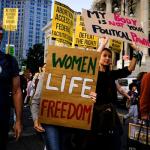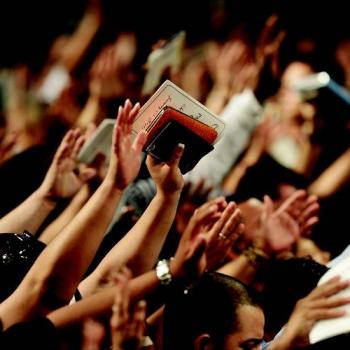
THE RELIGION GUY’S ANSWER:
Yes, according to a large and growing body of scientific research this past generation. But as with most things regarding religion, the following sketch of the discussion will indicate things may not be quite so simple.
Three recent articles neatly focus matters: “Some Mental-Health Benefits Are Linked to Going to Church” (Clare Ansberry, Wall Street Journal, April 16), “The True Cost of the Churchgoing Bust” (Derek Thompson, theatlantic.com, April 3), and “What Really Happens When Americans Stop Going to Church” (Daniel K. Williams, also theatlantic.com, last September 3). Also, the best-seller “Build the Life You Want,” by economist Arthur Brooks and Oprah Winfrey, says research shows whatever life’s challenges, happiness depends upon “family, friendship, work, and faith.”
Baylor University social scientist Byron R. Johnson told Ansberry “there is a mounting body of empirical evidence suggesting that people who are active in their faith tend to be the recipients of a number of important physical and mental health benefits.” His book “More God, Less Crime” covers one important aspect of such claims.
Other studies by the dozens upon dozens, with varied populations and methodologies, have associated regular religious belief and activity with peoples’ improved happiness, longer life spans, sense of well-being and of purpose, contentment with circumstances, optimism, marital satisfaction, quality of other relationships, and greater charitable giving and volunteering that in turn enhance good feelings. There are the reported reductions of heart and other medical problems, addiction, adultery, divorce, imprisonment, suicide, depression, anxiety and loneliness.
Johnson works at the intersection of major projects on this at Baylor’s Institute for Studies of Religion, Pepperdine University’s Center for Faith and the Common Good, and Harvard University’s Human Flourishing Program. The latter, founded in 2016, is a natural partner with Harvard Medical School’s long-running investigation of mind-body and spiritual influences in health, pioneered by the late cardiologist Herbert Benson. Through 2026, the Global Flourishing Study, co-directed by Johnson and sponsored by Harvard and Baylor, is investigating well-being in 22 nations.
U.S. Religion’s Great Depression
The context of public interest is 21st Century America’s entry into a Great Depression of church life as measured by faltering affiliation, attendance, and belief, surveyed in the 2023 book “The Great Dechurching.” This provokes consideration of how the secular rise affects the well-being of individuals and of society.
One historical note. Thompson says by 2021 America’s “membership in houses of worship fell below a majority for the first time on record.” However, research by sociologists Roger Finke and Rodney Stark estimated that only 17% of Americans were church members at the founding in 1776, which doubled to 34% by 1850 through evangelization, but only reached a slight majority of the population early in the 20th Century. U.S. religion is slumping backward to long-ago status.
The U.S. religious shrinkage since 2000 occurs simultaneously with notable increases in relational and emotional ills and loneliness, with particularly alarming numbers among youths. Social fragmentation was explored in e.g. “Bowling Alone” (2000, updated edition 2020) and “Coming Apart” (2012). Many blame alienation on obsessive social media use, but is a religious factor at work?
Pondering this, The Religion Guy turned to two past articles in the Science, Religion & Culture journal, the first by philosophy professor Justin McBrayer at Fort Lewis College and a follow-up by psychologist Luke Galen at Grand Valley State University.
McBrayer builds from a modern riff on “Pascal’s Wager,” a famous proposal from 17th Century French philosopher-scientist Blaise Pascal. Roughly speaking, he figured it’s reasonable to believe in God because while that may limit some material pleasures in this life it brings immeasurable benefits in the afterlife, whereas if it turns out that God does not exist, little has been lost.
“Good” whether God exists or not?
For McBrayer, “believing in God is good for you” for “prudential reasons” due to all that accumulating scholarship on the benefits provided in this life, whatever the truth about God and our afterlife. Research shows believers “do better” in life than non-believers “regardless of whether or not God exists.” (!) He then proceeds to scan research fundings on happiness, physical health, mental health, interpersonal relationships, and charitable activity.
Galen’s intriguing article responds that what’s operating here is not contentment produced by religious teachings but “chiefly social engagement and embeddedness in supportive groups.” He agreed it’s accurate that happiness is “associated with religious engagement,” for instance in a local church, but so can be the case with the non-religious in secular organizations. It seems the most vulnerable population is neither devout nor strongly anti-religious but feels “ambivalence or uncertainty” about religion and social involvements otherwise.
Various pundits have posed a related question with special urgency in the Trump Era: In general, is religiosity healthy or damaging for society, whatever the benefits faith provides to individuals? Historians say even skeptics among America’s founders believed widespread religious faith was essential to sustain a democratic society.
Faith slump’s societal impact
Many doubt that today, among them Phil Zuckerman, founder of the first U.S. “secular studies” department, at Pitzer College. In Religion News Service, he contended that “the best hope for our democracy may be the growing number of secular Americans” for whom unbelief is freely chosen, not compelled as under Communism. He said religious shrinkage correlates with “healthier democratic values and institutions” and greater tolerance toward people with different beliefs and behaviors.
That’s disputed in the articles cited above by journalist Thompson, a religious agnostic raised in Reform Judaism, and historian Williams, who teaches at Ashland University, a Brethren Church school. Thompson deems it “undeniable” that “nonreligious Americans are also less civically engaged” and many, “having lost the scaffolding of organized religion, seem to have found no alternative method to build a sense of community.”
As a journalist, The Religion Guy agrees that America’s innumerable local religious congregations, fellowships, and charities have (till now) provided a vast network providing healthy social outlets while there’s no equivalent to engage devotedly secular people.
Religion’s slide has occurred alongside dangerously hostile polarization in American politics. Coincidence? Williams observes that “people become even more entrenched in their political views” when they stop attending worship. Politics “becomes their church.” Though some suppose religion worsens a society’s divisions, he says to the contrary that leaving churches removes religion’s tgenerally moderating influence, “opening the door to extremism.” Agree?











